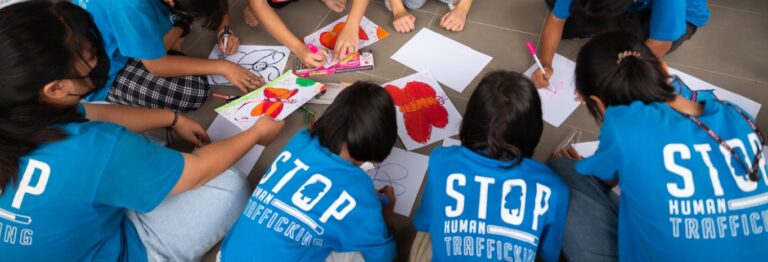It’s More Than Just Cleaning Up Supply Chains
For this piece, I talked with Helen Sworn, Founder and Director of the Chab Dai Coalition in Cambodia. She has been working in the anti-trafficking sector in Cambodia for almost 20 years. Before coming to Cambodia, she had a background in business and management, which gave her insights into the corporate perspective and the complexities large multinational corporations might be dealing with, which then helped her see how NGOs and large businesses could work alongside each other rather than at odds with each other. We are grateful for her sharing this perspective with us today.
Why We Need Businesses
Trafficking and other forms of labor and human rights abuses are so pervasive, and yet so elusive to eradication that it really takes having everyone on board to try to combat it. As Sworn explains, “I used to say that no one organization, no one NGO can address this on their own. But now I’m totally convinced that actually no one sector can address this on their own. As the NGO sector, we don’t own this one issue. This is not us in our white capes coming in and saving the world from trafficking. The underlying systemic issues are way too complex to be addressed by any one sector.” Because the root causes of trafficking (poverty, a devaluing of certain human lives, social and/or legal exclusion, etc.) are systemic, it takes a systemic response.
Sworn argues that in order to tackle the problem more effectively, we need to be more thoughtful and clear about what each player—whether NGO, government actor, or corporation—can offer and can influence, and thereby leverage each sectors’ core competencies. For NGOs, this means raising awareness, bringing a victim-centered approach to the table. For government actors, this means setting and implementing effective laws, and ensuring effective prosecution for noncompliance. But what does it mean for businesses?
What the Corporate Sector Can Do
The obvious solution, and the one most people focus on is cleaning up the supply chain to make sure they’re slave-free. Sworn says, “The businesses that I’ve intersected with, especially compliance officers, those compliance officers are incredibly well networked valves, they are already driving change at a multinational level.”
Cast the Net Wider
“But,” she continues, “It’s not just about slavery, it’s about all human rights, and I think if we approach things from a human rights framework rather than an anti-trafficking framework, I think we’ll be able to address much more of the complexities of the issues rather than just looking for slaves in the supply chain. We can look for other issues that have often been often put by the wayside in this witchhunt on the supply chain.” When we focus on slavery in the supply chain it helps us capture those types of abuses. However, Sworn has found that if you shift from a anti-slavery framework to a human rights framework, then you can capture a host of other problems, such as: issues around labor rights, ethnic or gender discrimination issues, sexual harassment cases, and other power abuses that happen. When you cast the net wider, then you pick up slavery in the supply chain but you can also pick up other human rights abuses.
How NGOs Can More Effectively Engage the Corporate Sector
Stop the Witchhunt Tactics
According to Sworn, there are a number of multinational corporations who are making strides in raising ethical standards in operations, but that aren’t taking advantage of this angle in PR because they don’t want to risk potential backlash. They fear that one minute people will tout what an amazing job they’re doing, and the next, point out their failures, leading to boycotts and all kinds of other negative publicity, and they’re just not willing to assume that risk. From the businesses’ perspective, they feel they understand the complexities of addressing not just slavery in supply chains but other human rights issues, but that you can’t employ hundreds of thousands people around the world without issues. Every single organization and company, whether human rights NGO or large multinational, will have human resources issues because there is nobody who is perfect.
However, NGOs do have a vital role to play in pointing out where there are abuses and how we can do better. So what does this mean for how we should engage the corporate sector?
Focus on Positive Rather Than Punitive Relationships
Rather than pitting ourselves against corporations, Sworn advocates working alongside them to show that we can provide valuable services that are in the corporations interest (because, hey, they want to avoid lawsuits too). She says that some of the ways she has worked with compliance officers is in helping them understand what some of the legal frameworks are within their jurisdiction, what some of the services are that could be available to their employees, and essentially, coming alongside them and asking, “What is it that I can do for you? What can I help resource you in? How can we have a conversation?” We have seen similar partnerships between NGOs and law enforcement agencies become very effective in shifting law enforcement towards a victim-centered approach, and a much stronger working relationship. If we can apply the same model of collaboration between NGOs and the corporate sector, we may be able to pose a formidable front against those perpetrating abuses and exploitation.
Thank you, Helen, for your time and for sharing your perspective with us!




